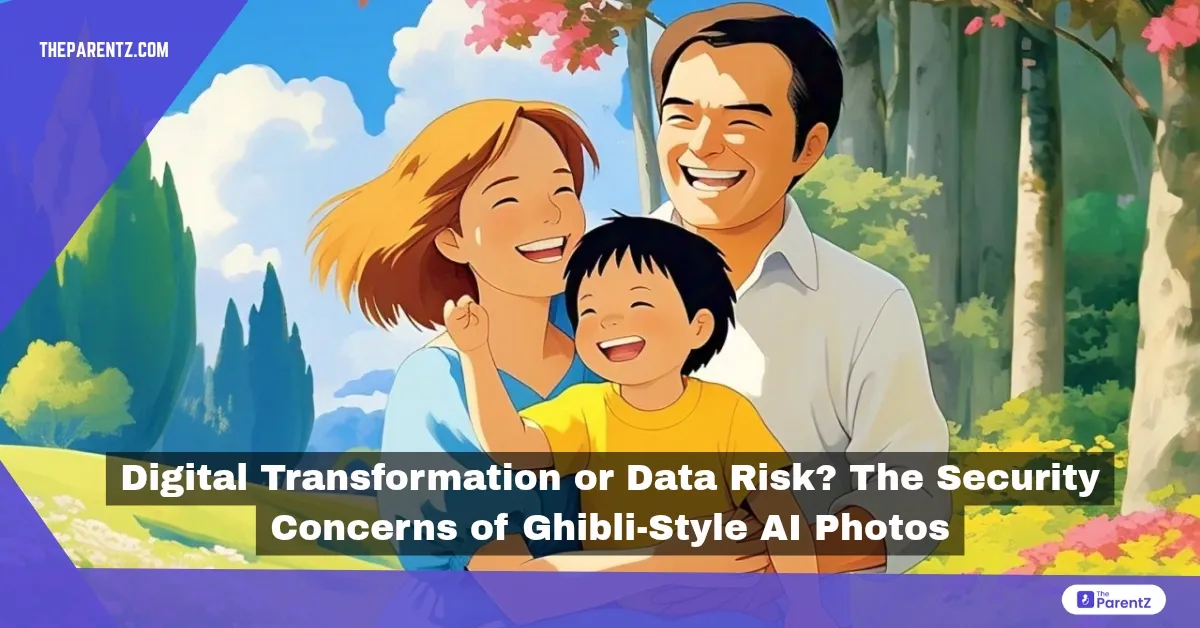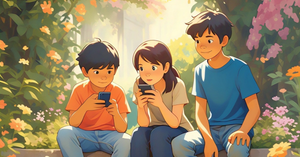The internet is buzzing with a new craze: Ghibli-style AI photos. If you’ve been on Instagram, TikTok, or Facebook lately, you’ve probably seen them—adorable portraits that transform people into whimsical characters straight out of a Studio Ghibli movie. It’s fun, it’s creative, and it’s everywhere. However, while this trend is undeniably fun, it raises significant security concerns that parents need to understand to protect their families.
Why Is Everyone Obsessed With Ghibli-Style AI Photos?
The appeal is obvious—who wouldn't want to see themselves transformed into a character that looks like it stepped out of a magical Studio Ghibli film? The results are undeniably charming, and the social sharing aspect creates a snowball effect. When we see friends and family posting their transformed images, we naturally want to try it, too.
This isn't just for kids—adults are equally captivated by seeing themselves reimagined in this artistic style. Entire families are uploading group photos, couples are creating animated versions of themselves, and the trend continues to gain momentum across all age groups.
But while it seems harmless to upload a photo and share the result online, there’s more to this trend than meets the eye. Cybersecurity experts are raising alarms about what happens to your photos once they’re uploaded.
The Hidden Risks of Uploading Your Photos
Here’s the thing: When you upload your photo to an AI app, you’re often giving that app permission to use your image in ways you might not fully understand. Experts warn that these apps can use your photos to train their AI models or even sell your data to third parties. Once your photo is online, you lose control over how it’s used.
Some risks include:
- Deepfake Technology: High-resolution images can be manipulated into deepfakes, which could be used for misinformation or fraud.
- Identity Theft: Scammers can create fake profiles using your photos.
- Data Sales: Your images and metadata could be sold to advertisers or data brokers.
- Blackmail or Extortion: Misused images could be exploited for malicious purposes.
This is especially concerning when it comes to children’s photos. Many parents love seeing their kids transformed into Ghibli characters, but experts strongly advise against uploading children’s images. These photos could be used to track behavioral patterns or facial recognition data from an early age—data that could be exploited later.
What Parents Need to Know
If you’re a parent wondering whether this trend is safe for your family, here’s what you need to know:
- Understand the App You’re Using: Before uploading any photos, check whether the app is legitimate. Stick to apps available on official stores like Google Play or the App Store. Avoid downloading apps from unknown sources or links shared on platforms like Telegram.
- Read Privacy Policies: Take time to read the app’s privacy policy. Some apps require full access to your gallery, while others allow limited permissions. Only grant access that is absolutely necessary.
- Avoid Public Wi-Fi: Don’t upload sensitive photos while connected to public Wi-Fi networks—they’re more vulnerable to hacking.
- Be Careful With Sensitive Information: Never upload photos that include office ID cards, documents, or anything revealing personal details like addresses.
- Monitor Your Kids’ Online Activity: Kids today often seek validation through likes, shares, and comments on social media posts. Talk to them about the risks of sharing personal images online and set boundaries around their digital behavior.
What to Do If Your Photos Are Misused
If you discover your photos have been leaked or used without permission:
- Perform a reverse image search to locate where they might be appearing online
- Use tools like Take It Down or StopNCII to request removal
- Report unauthorized use to the platform where it appears
Is It Worth The Risk?
It’s easy to get swept up in the excitement of seeing yourself as a Ghibli character—but is it worth potentially compromising your privacy? Cybersecurity experts suggest thinking twice before uploading personal photos to any AI tool unless you fully trust its data-handling practices.
While these tools promise fun and creativity, they also come with risks that aren’t immediately obvious. Once your photo is uploaded, you have little control over how it might be used in the future—whether for training AI models or being sold for targeted ads.
How To Stay Safe While Enjoying The Trend
If you still want to try out Ghibli-style AI photos but want to stay safe, here are some tips:
- Use low-resolution images instead of high-quality ones.
- Add watermarks to discourage misuse.
- Turn off auto-sync features that might upload images without your knowledge.
- Avoid uploading children’s photos altogether.
- Use secure networks and limit permissions when using apps.
A Message For Families
It’s not just kids who are excited about this trend—parents and entire families are participating, too! But as fun as it is, it’s important for everyone in the family to understand the risks involved. Talk openly about digital safety with your kids and make informed decisions together.
Conclusion
The bottom line? These trends can be enjoyable if approached with caution. By being mindful of what you share online and understanding how your data might be used, you can protect yourself and your loved ones while still having fun with technology. So, before you hit “upload,” take a moment to think about whether that magical portrait is worth the potential cost!









Be the first one to comment on this story.